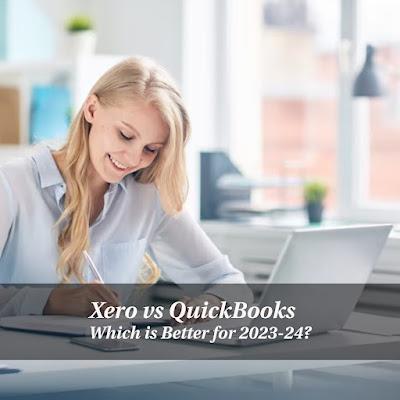
Are you in the market for accounting software but feeling overwhelmed with all the options available? Two of the most popular choices are Xero and QuickBooks. Both offer a wide range of features to help businesses manage their finances, but which one is right for you? In this ultimate accounting software battle, we’ll compare Xero vs QuickBooks to help you make an informed decision. So buckle up and get ready for a deep dive into these two powerful tools!
Comparing Xero vs QuickBooks
Xero and QuickBooks are two of the most popular accounting software programs on the market. While Xero vs QuickBooks have many similarities, there are also some key differences that set them apart.
Xero is a cloud-based accounting system, meaning all data is stored online rather than being housed on your computer. This allows for easy access from anywhere with an internet connection. Conversely, QuickBooks offers both a desktop version that requires installation on your computer as well as a cloud-based option.
Another notable difference between these two systems is their pricing models. Xero has a tiered pricing structure based on the number of users, while QuickBooks charges per feature bundle or subscription level.
In terms of features, both Xero and QuickBooks offer basic functions such as invoicing and expense tracking. However, Xero excels in areas like inventory management and project tracking while QuickBooks offers more advanced reporting options.
When comparing Xero vs QuickBooks it's important to consider which features you value most in an accounting software program and how much you're willing to pay for those features.
Xero Overview
Xero is a cloud-based accounting software that has been designed to simplify the accounting process for small businesses and startups. The platform offers a wide range of features including invoicing, expense tracking, bank reconciliation, financial reporting, inventory management, and more.
One of the standout features of Xero is its user-friendly interface. With its intuitive design and easy-to-use dashboard, users can navigate through the system with ease. Moreover, it offers seamless integration with other applications such as PayPal and Stripe which makes it easier for businesses to manage their payments.
Another great feature of Xero is its mobile app which enables users to access their accounts on-the-go from anywhere in the world. This means that business owners can keep track of their finances even when they are not in front of their desktops.
Xero is an excellent choice for small business owners who want an affordable yet efficient accounting solution. Its powerful features coupled with its easy-to-use interface make it one of the best options available on the market today.
QuickBooks Overview
QuickBooks is an accounting software developed by Intuit. It was designed to help small and medium-sized businesses manage their finances, including invoicing, expenses tracking, payroll management, and tax filing. With over 7 million active users worldwide, QuickBooks has become one of the most popular accounting tools in the market.
The software offers various plans to cater to different business needs. QuickBooks Online is a cloud-based version that lets you access your financial data from anywhere with an internet connection. On the other hand, QuickBooks Desktop offers more advanced features but requires installation on a computer.
One of the key benefits of using QuickBooks is its easy-to-use interface. The dashboard displays all key financial information like income, expenses, profits and losses at a glance. You can customize reports and invoices with your company logo for a professional look.
Another notable feature of QuickBooks is its integration capabilities with third-party apps like PayPal and Shopify which makes it easier for online sellers to track their sales across multiple platforms without manual entry.
QuickBooks provides powerful accounting tools suitable for small businesses that require both simple or complex functions such as invoicing and inventory management among others while still remaining user-friendly yet not sacrificing quality results
The Pros and Cons of Xero vs QuickBooks
When it comes to choosing an accounting software for your business, both Xero and QuickBooks have their own set of pros and cons. Let's take a closer look at what each platform has to offer.
Xero offers unlimited users with no extra cost, making it ideal for businesses with multiple employees or team members who need access to the software. It also has a user-friendly interface, making it easy for those without an accounting background to navigate.
On the other hand, QuickBooks is known for its robust reporting capabilities and advanced inventory management features. It also integrates seamlessly with many third-party apps, allowing you to customize your experience based on your specific needs.
However, Xero falls short in terms of customer support options compared to QuickBooks. While Xero has email support available 24/7, they do not offer phone support unless you purchase their premium plan. Similarly, while QuickBooks does offer phone support during business hours, their customer service can sometimes be slow or unresponsive.
Whether you choose Xero or QuickBooks will ultimately depend on the unique needs of your business. Take time to evaluate each platform's features and consider what matters most to you before making a decision that will impact your finances and operations moving forward.
Which Accounting Software is Right for You?
Choosing the right accounting software for your business can be a daunting task, but it's an essential decision that requires careful consideration. When comparing Xero and QuickBooks, there are several factors to consider before making a final decision.
Take into account the size of your business and its specific needs. If you're running a small business with basic bookkeeping requirements, Xero may be the better choice due to its user-friendly interface and affordable pricing plans. On the other hand, if you have complex financial operations or require advanced inventory tracking features, QuickBooks may be more suitable.
Another important factor to consider is compatibility with your existing systems and tools. Both Xero and QuickBooks offer integrations with popular third-party apps like PayPal, Shopify, and Stripe. However, if you primarily use Google Suite or Microsoft Office 365 for your daily tasks, QuickBooks may provide better integration options.
Affordability is also key when choosing between these two accounting software giants. Although both offer competitive pricing plans that cater to different budgets - take note of any additional fees such as transaction fees or payroll processing charges that could impact your expenses in the long run.
Ultimately though both choices provide solid solutions with their own strengths so base it on what suits best for your unique situation!
Conclusion
After taking a closer look at Xero vs QuickBooks, it’s clear that both accounting software options have their own unique benefits and drawbacks.
For small business owners who want a more user-friendly interface and the ability to access their data anytime, anywhere with cloud-based technology, Xero may be the way to go. On the other hand, if you’re looking for an established brand with robust features and integrations, QuickBooks may be your best option.
Choosing between Xero vs QuickBooks depends on your specific needs as a business owner. Before making any decisions, take some time to evaluate what you need from your accounting software and do thorough research into each platform.
No matter which option you choose in this ultimate accounting software battle of Xero vs QuickBooks, both choices offer powerful tools that can help streamline your financial management processes so you can focus on growing your business.
Source: https://www.linkedin.com/pulse/xero-vs-quickbooks-ultimate-accounting-software-battle/

